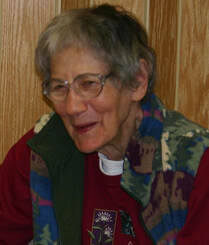 How do we navigate life’s in-between times? Maybe it’s the time between receiving a diagnosis and learning whether the treatment has been effective. Or the transition between a full-time job and retirement. Perhaps it’s being in the midst of a moral seismic shift or a global pandemic without being sure about when or how either will end. As we attempt to find a way through these in-between times, sometimes we allow worry to sit in the driver’s seat. We all worry from time to time. And sometimes worry motivates us to solve a problem or make a needed change. But during in-between times, worry often takes on a compulsive nature and leads us down dead-end roads. At other times we treat wishes as a sort of GPS. We equate fulfilling our wishes with following a roadmap that will guide us through the uncertainty of in-between times. But as one saying goes: “Wishes are for genies.” We often wish for things that are unlikely to happen or be achieved—and often during desperate times. So if worry and wishes both fall short, how else might we think about navigating life’s in-between times? How about waiting?
1 Comment
 As I was working on a sermon about praying when we’re uncertain, a story came to mind. It involves a friend who died recently and whose birthday would have been next week. On the day I began work at the congregation where Paul was the church administrator, he and another staff member took me to lunch. As soon as the server brought our meals, Paul looked at me and asked, “Would you like to pray?” While I typically don’t say grace in restaurants, I did that day. Later I questioned Paul why he’d asked me to pray. “Well, you’re a pastor, so I thought maybe you’d want to,” he responded. My reply came perhaps a bit too quickly: “Don’t ever ask me to do that again.” That experience became a running joke between Paul and me. Whenever we were together, something in a conversation might well prompt Paul to lean over and—with a big smile on his face—ask, “Would you like to pray?” Would you like to pray? It’s not that I don’t want to pray. It’s just that sometimes I’m uncertain about the when and where and even the how of praying. Or maybe it’s that I’m uncomfortable about the certainty with which some people seem to pray.  When I think about joy, one of my favorite people comes to mind. Margaret was an older member of the congregation I pastored in Jamestown, Rhode Island. She always had a smile on her face and a laugh on her lips. She was filled with a joy that spilled out and touched everyone who came in contact with her. Margaret was a walker. She walked with purposeful stride and a brisk pace, but that never kept her from stopping to speak to someone. When Margaret first moved to Jamestown, she didn’t feel welcome. No one was overly friendly. So Margaret became her own version of a joy-filled welcome wagon. She might not have felt welcomed, but she was determined to welcome others. In the process, she radiated a joy that was contagious. I sometimes wondered about the source of Margaret’s joy. While she never complained, her life hadn’t always been easy. She cared for her husband as he was dying. Then she did the same for one of her sons. On one of my last days in Jamestown, Margaret stopped by office. While we talked, she reminded me about a sermon I’d preached several years earlier. I had suggested people consider keeping a journal in which they would note things for which they were grateful. I learned that Margaret had been keeping a daily gratitude journal ever since. That day I began to understand that Margaret’s joy grew out of her deep sense of gratitude. She was grateful for the big and the little things in her life. She saw it all as a gift and that translated into joy.  This summer I’m preaching for one of the congregations in our region. I wonder if folks there questioned their decision to invite me when they learned my first sermon with them would be about rest. I can imagine them thinking: “Rest? Really? Given all that’s going on in the world, that’s the best she could come up with?” In my defense, I used a text from the lectionary for that Sunday. Plus, the sermon was the first in a series I planned about what happens when the season we call Ordinary Time isn’t ordinary. While rest might not seem like the most obvious topic, I do wonder. I wonder what rest means at a time when we feel restless. Restless because we’ve been at home for months and separated from people we love. Restless because we we’re unsettled by the unknown and unsure when things might get better. I wonder what rest means at a time when we’re surrounded by unrest. Unrest that’s been sparked by violence played out in front of our eyes. Unrest that reveals great divides that we’ve too often ignored or attempted to hide.  At the beginning of June, those of us in the Christian tradition entered the longest season of the church year. Until Advent we’ll be in what’s known as the season after Pentecost. Sometimes we refer to this period as Ordinary Time. The part of the liturgical calendar that falls outside the major seasons. Ordinary Time. To be honest, I can’t remember a time that has felt less ordinary. During the past few months, a global pandemic has turned our lives, our country, our world upside down. The ordinary things that filled our lives—going to the office or to school, visiting with friends and family, shopping at the mall or eating at our favorite restaurant—all those things stopped or became much more complicated. And just when it seemed we might slowly be moving toward something that feels a bit more normal, an unrest began sweeping through our cities and towns. An unrest that reminds us that returning to normal may not be such a good goal after all. The normal that’s worked for many of us has long been a burden or illusion for other Americans—especially those of color. Over the next few weeks I hope you’ll join me in reflecting on what it means when Ordinary Time isn’t ordinary. To consider things we might have taken for granted or approached differently at any other time. Until then, may the spirit of Pentecost continue to blow through this season after. KP |
Kathryn PalenAssociate Executive Minister Archives
January 2023
Categories |
 RSS Feed
RSS Feed